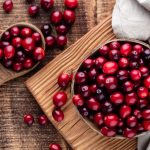Improve your heart health with these tart berries
 (NaturalHealth365) For many people, eating cranberries is a sort of “one-off.” A traditional, time-honored companion to turkey and stuffing, cranberries may be consumed at a holiday meal – often in the form of canned, processed cranberry jelly – then promptly forgotten until next year. But, if this is the extent of your experience with cranberries, you may be missing out on valuable nutrients and plant compounds that can make for a “happy heart.”
(NaturalHealth365) For many people, eating cranberries is a sort of “one-off.” A traditional, time-honored companion to turkey and stuffing, cranberries may be consumed at a holiday meal – often in the form of canned, processed cranberry jelly – then promptly forgotten until next year. But, if this is the extent of your experience with cranberries, you may be missing out on valuable nutrients and plant compounds that can make for a “happy heart.”
In a new study conducted at King’s College, London, researchers discovered that polyphenols in cranberries could improve blood vessel function, thereby promoting cardiovascular health. So let’s see what makes these tart little crimson berries so uniquely beneficial to the human heart.
Well-controlled study on cranberries yields impressive findings
The “gold-standard” trial – a type of research widely acknowledged as the most rigorous kind of study – involved a group of healthy young men given a cranberry extract every day for a month (with a control group receiving a placebo). The team found that the cranberry extract significantly improved cardiovascular function, resulting in better flow-mediated dilation – a marker of heart health that measures the widening of blood vessels.
The researchers noted that the improvements began as soon as two hours after cranberry consumption and persisted throughout the month of the study. Significantly, the volunteers didn’t have to gobble large quantities of cranberries or consume high extract dosages. The amount used in the study – nine grams of freeze-dried powdered berries – was roughly equivalent to eating a daily 100-gram serving of fresh cranberries, an amount the scientists called “reasonable.”
Researchers find “solid evidence” of vascular benefits from cranberries
The study, published last month in the journal Food and Function, illustrated the impact of cranberries on heart health. Lead author Dr. Ana Rodriguez-Mateos, of the Department of Nutritional Sciences at King’s College London called cranberries an “important fruit” in the prevention of heart disease for the general public. “The increases in polyphenols … and related improvements in flow-mediated dilation after cranberry consumption emphasize the important role cranberries may play in cardiovascular disease prevention,” Dr. Rodriguez commented. Co-author Dr. Christian Heiss, Professor of Cardiovascular Medicine at the University of Surrey, agreed. “Our findings provide solid evidence that cranberries can significantly affect vascular health, even in people with low cardiovascular risk,” Dr. Heiss pointed out. In other words, eating cranberries can help keep an already-healthy heart in good shape.
Proanthocyanidins help neutralize harmful free radicals
Botanically known as Vaccinium macrocarpon, cranberries are closely related to blueberries and bilberries and share many of their properties. Cranberries are rich in antioxidant compounds, including quercetin, myricetin (also found in parsley and celery), and ursolic acid, which have anti-inflammatory effects. These antioxidants can scavenge harmful free radicals that would otherwise cause oxidative stress and damage. As if that weren’t enough antioxidant “bang for the buck,” cranberries contain the antioxidant vitamins C and E and a substantial amount of heart-healthy fiber.
But, the real key to the cardiovascular benefits of cranberries could be their proanthocyanidins. Research has shown that these natural plant pigments may help keep arteries supple and flexible while helping to maintain desirable cholesterol readings. In addition, proanthocyanidins help to regulate the balance of “friendly” versus “unfriendly” bacteria in the all-important gut microbiome, the community of bacteria in the digestive tract. Finally, proanthocyanidins can also decrease levels of a pro-inflammatory substance known as homocysteine.
Clearly, these berries have what it takes to support efficient heart function.
Use in salads, sauces, and salsa
Cranberries are available fresh, dried, powdered, or juiced. Because the fresh, raw berries are so naturally tart and acidic, you probably won’t want to nibble them “straight” as a snack. However, you can incorporate these crimson delicacies into recipes with a little creativity and imagination.
For example, you can pair dried berries with roasted, lightly salted nuts to create a satisfying homemade trail mix or stir them – along with raspberries and strawberries – into yogurt. This trio of colorful berries can also add flavor, fiber, and antioxidants to oatmeal. (For best results, add during the last minute of cooking). Make a refreshing salsa by combining chopped fresh cranberries with minced red onion, jalapeno peppers, cilantro, lime juice, and a bit of honey to taste. You can also add fresh or dried berries to salads, sauces, and marinades. Another option is to freeze cranberries and use them as you would ice cubes, adding them to fruit punches or spritzes for a festive touch.
Natural health experts say that cranberry juice offers health benefits but lacks the fiber found in whole berries. It’s best to limit yourself to two cups of cranberry juice a day. Opt for 100 percent cranberry juice, and avoid “cocktails” or “juice blends” that may contain large amounts of sugar. (Dried cranberries may also be loaded with sugar to make the taste more palatable. ClevelandClinic.org reports that one serving of dried cranberries can contain a stunning 25 grams of added sugars! To avoid taking in excessive sugars, always check the labels).
As large amounts of cranberries can cause stomach upset and diarrhea, they should be consumed in moderation. They can also increase the risk of kidney stones in susceptible people.
Full of antioxidants, fiber, and beneficial micronutrients, cranberries make a great addition to your healthy diet. Maybe it’s time to put these tarts, tiny fruits on the menu year-round!
Sources for this article include:



